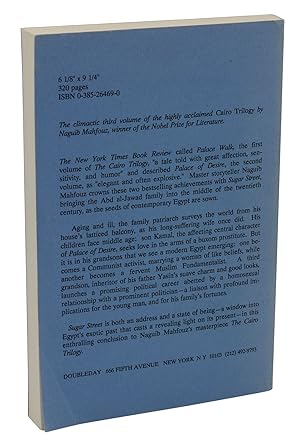
Release comes from writing philosophical articles for a small magazine while he denies himself any opportunity for love relieving his natural compulsions as a regular client to a discrete prostitute. Darwin, Russell, Bergeson, Spinoza, Leibniz and Schopenhauer are his friends now. Now a respected school teacher, Kamal chooses to find intellectual stimulation in books rather than from friends. Having suffered the torment of youthful unrequited love and the departure of his cultured friends, Kamal lives a steady monotonous existence. Kamal, Al-Sayyid Ahmad and Amina’s youngest son and the focus of the previous novel Palace of Desire, has made the top floor of his parent’s house his personal apartment. The atmosphere of the house was charged with warning signs of misery and death. He was having to witness Aisha’s disintegration and downfall. His mother was wasting away and disappearing into old age. It was hard to see his father, who had been so forceful and mighty, grow weak. Their daughter, Aisha, formerly a great beauty, is now little more than a ghost permanently grieving for the swift loss of her husband and sons to typhus.

His wife, Amina, enjoying the greatest freedom of her life, does little more than pray and visit mosques. Al-Sayyid Ahmad can no longer manage to ascend the stairs to the top floor of his own house.

The al-Jawad family patriarch, Al-Sayyid Ahmad, and his friends are now paying the price for their years of heavy partying with hypertension and heart disease. Note – since this novel is the third part of a trilogy, this review contains spoilers with regards to the first two novels Palace Walk and Palace of Desire. In Sugar Street, the final novel of Naguib Mahfouz’s Cairo Trilogy, change and tragedy continue for both the al-Jawad family and for Egypt as the height of the Great Depression gives way to a new European war and the terror of new weapons while independence for Egypt remains elusive.


 0 kommentar(er)
0 kommentar(er)
